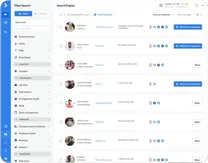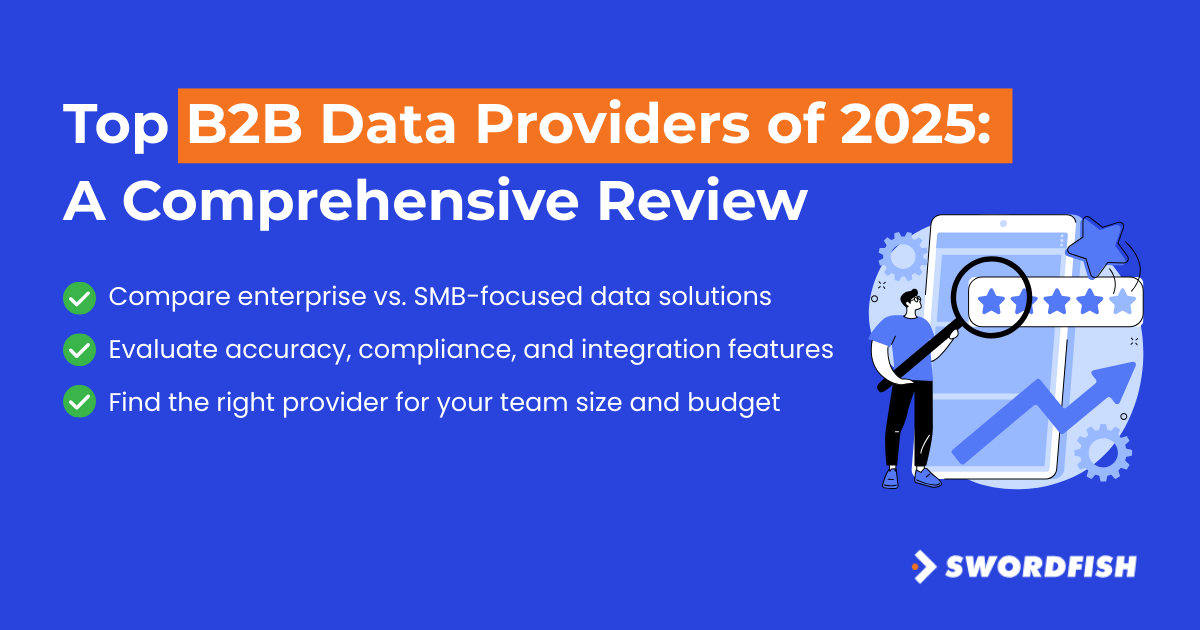
With B2B data accuracy now reaching 95%+ from top B2B data providers 2025 and flexible pricing models becoming standard, selecting the right data partner directly impacts your sales pipeline. SMB-focused solutions like Swordfish offer exceptional value at $99–599/month, while enterprise platforms like ZoomInfo cost $15,000+ annually but provide comprehensive sales intelligence.
The B2B data provider landscape in 2025 has evolved dramatically, with the global B2B ecommerce market valued at $32.11 trillion driving unprecedented demand for accurate contact data. With 80% of B2B sales interactions predicted to occur through digital channels this year, partnering with the right top B2B data providers 2025 is mission-critical for sales and marketing success.
Key takeaways
- Data accuracy rates now range from 90-98% across top providers using AI-powered validation.
- SMB-focused providers (Swordfish, Kaspr, Lead411) deliver 95%+ accuracy at $1,200-$3,600 per year.
- Enterprise solutions (ZoomInfo, Cognism) offer comprehensive features but cost $15,000+ annually.
- GDPR, CCPA, and 20+ US state privacy laws require strict compliance measures.
- Waterfall enrichment and real-time validation are now table stakes features
- Credits-based pricing models are giving way to unlimited plans for predictable budgeting
What Are B2B Data Providers and Why They Matter in 2025?
B2B data providers are specialized companies that aggregate, verify, and deliver business contact information to help sales and marketing teams identify and reach their ideal prospects. In today’s digital-first world, these platforms serve as the foundation for successful outbound strategies.
The importance of B2B data providers has skyrocketed as traditional prospecting methods become less effective. Cold calling success rates have plummeted to under 2%, while email open rates continue declining due to inbox saturation. Quality data providers bridge this gap by offering:
- Verified contact information including emails, direct dials, and cell phones with 95%+ accuracy.
- Company intelligence such as technographics, firmographics, and intent data.
- Real-time validation to ensure deliverability and connectivity using AI-powered verification
- Compliance frameworks to navigate privacy regulations across 20+ US states.
- Integration capabilities with CRM and sales engagement platforms.
- Waterfall enrichment technology that combines multiple data sources for maximum coverage.
The stakes have never been higher. Leading providers now guarantee 98% accuracy rates with some reporting bounce rates under 2%, but choosing the wrong solution can waste thousands in budget while destroying your sender reputation and team productivity.
B2B Data Types and Their Applications in 2025’s Top Providers
Core Data Types
B2B data encompasses several distinct categories, each serving different business functions:
- Firmographic Data: Includes company size, industry, revenue, location, and growth trajectory. This foundational information helps businesses segment markets and identify organizations that match their ideal customer profile.
- Technographic Data: Reveals the technology stack used by target companies, including hardware, software (CRM, CMS, ERP), and software adoption rates. This enables vendors to position their products as complements or superior alternatives to existing tools.
- Intent Data: Tracks online behaviors that indicate purchase readiness, such as content consumption, search patterns, and engagement with specific topics. This allows sales teams to reach out at the optimal moment when prospects are actively researching solutions.
- Contact Data: Provides verified information about key decision-makers, including emails, phone numbers, and social profiles. Accurate contact data ensures outreach efforts connect with the right people to build relationships faster .
- Behavioral Data: Captures patterns in how companies interact with digital content, helping to identify emerging needs and interests before formal research begins.
Data Applications Across Business Functions by Top B2B Data Providers 2025
The various types of B2B data power numerous critical business activities:
- Lead Generation: By analyzing firmographics, technographics, and intent data, businesses can pinpoint top B2B lead generation companies that align with their offerings, increasing qualified leads and maximizing ROI.
- Account-Based Marketing (ABM): Data drives the research and creation of target account lists and ideal customer profiles (ICP). Companies with data-backed ICPs achieve 68% higher account win rates.
- Personalization: With 66% of B2B buyers expecting personalized interactions, high-quality customer data is necessary to deliver custom experiences tailored to specific industry pain points.
- Competitive Analysis: Monitoring competitors’ tech stacks, locations, employee count, and product purchases helps businesses predict expansion moves and identify market gaps.
- Risk Assessment Act: Firmographic and financial data supports evaluation of client stability and partnership viability before committing significant resources.
Essential Criteria for Evaluating Top B2B Data Providers 2025
1. Data Accuracy and Advanced
Data accuracy remains the most critical factor when evaluating B2B data providers.
Here’s what to prioritize:
- Email Accuracy Standards: Look for providers guaranteeing 95%+ accuracy with real-time email verification. The best platforms use multiple validation methods including SMTP checks, domain verification, catch-all detection, and AI-powered validation algorithms.
- Phone Number Connectivity: Cell phone accuracy is often lower than email accuracy. Providers like Swordfish provides personal cell phones data and higher connectivity rates through real-time line validation, while Cognism’s Diamond Data® ensures phone-verified mobile numbers.
- Geographic Coverage: Ensure your chosen provider offers strong coverage in your target markets. US-focused providers typically achieve higher accuracy rates domestically, while global providers may sacrifice quality for breadth.
- Database Freshness: Contact data decays at 22% annually. Top providers refresh their databases monthly or quarterly, with some offering real-time updates through living data networks and 2+ million data contributors.
2. AI-Powered Features and Waterfall Enrichment
Modern providers are leveraging artificial intelligence and advanced data orchestration:
- Waterfall Enrichment Technology: Platforms like Persana AI and Clay combine data from 75+ sources through waterfall enrichment, ensuring maximum data coverage while minimizing costs by only charging for new information found.
- Intent Data Integration: Advanced providers track buying signals including job changes, hiring patterns, funding rounds, and website visits to identify high-potential prospects at optimal timing.
- AI-Powered Personalization: Automated generation of custom email and LinkedIn messages at scale, with some platforms achieving 30% higher response rates.
- Predictive Analytics: Machine learning algorithms that predict data decay, identify best contact timing, and score lead quality automatically.
3. Data Sources and Collection Methods
Understanding how providers source their data is crucial for compliance and quality assessment:
- Ethical Data Collection: Reputable providers combine publicly available information, partnerships, and user-contributed data. Avoid providers using questionable scraping methods or purchased lists.
- Living Data Networks: Leading platforms like Apollo.io maintain accuracy through millions of data contributors, email engagement tracking, and proprietary web-crawling algorithms.
- Multi-Source Verification: The best providers use 7-step verification processes and cross-reference information across multiple databases before delivery.
- Source Transparency: Providers should clearly explain their data collection methods and allow you to exclude specific sources if needed for compliance reasons.
4. Compliance and Privacy Features
With GDPR, CCPA, and CAN-SPAM regulations governing B2B data usage, compliance features are non-negotiable:
- GDPR Compliance: Ensure providers offer EU data exclusion options and maintain proper consent records. Leading providers check 13+ Do Not Call lists compared to competitors who may check only 1-3.
- CCPA Requirements: California-based prospects have rights to know, delete, and opt-out of data collection. Your provider should support these requests seamlessly.
- Do Not Contact Lists: Advanced providers maintain suppression lists and honor unsubscribe requests across their entire network.
- Data Processing Agreements: Ensure your provider offers compliant DPAs outlining data handling, storage, and deletion procedures.
Enterprise vs SMB B2B Data Providers: A Detailed 2025 Analysis
SMB-Focused Providers
Swordfish
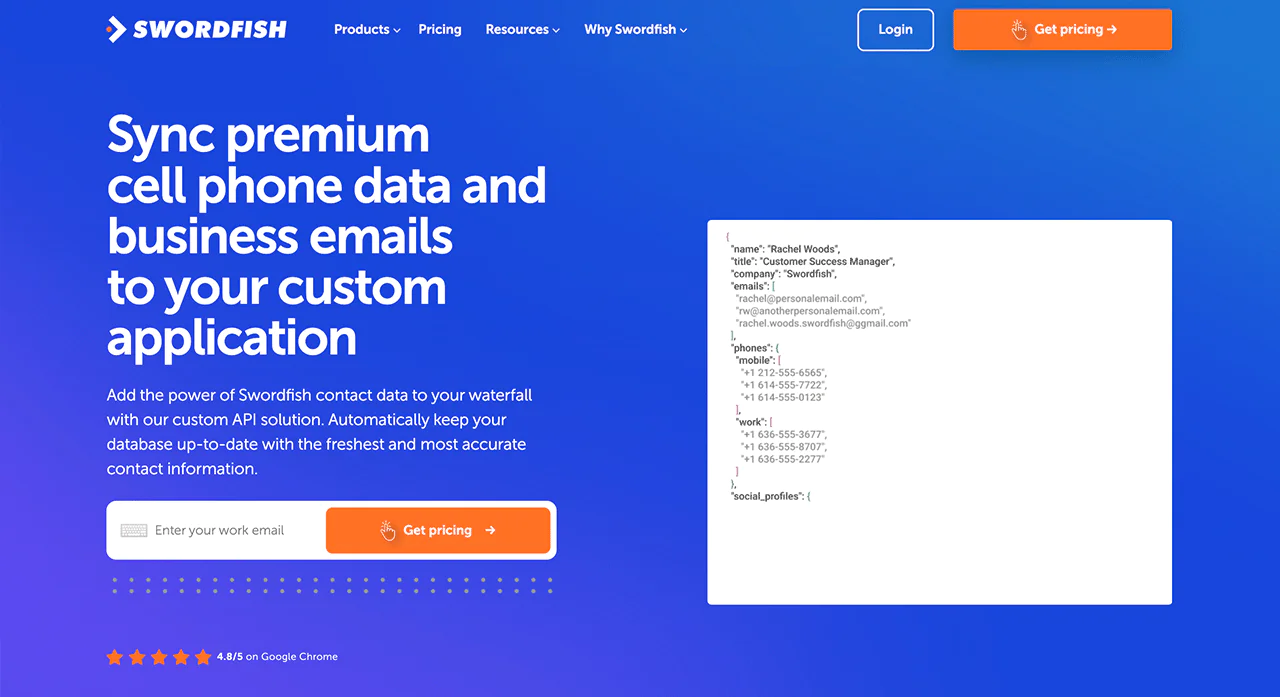
Swordfish.ai specializes in personal emails and cell phone numbers with unlimited pricing plans starting at $99/month. Ideal for recruitment and sales teams needing direct prospect access with 95% accuracy guarantee.
Strengths:
- 95% email accuracy guarantee with real-time validation
- Real-time phone connectivity validation
- 200+ live data partners
- Transparent unlimited pricing ($99-$599/month)
- Strong compliance framework (GDPR/CCPA compliant)
- No credit restrictions encouraging data exploration
Kaspr

Chrome extension-focused provider popular among SDRs for LinkedIn prospecting. Updated interface and real-time data collection from 150+ sources in 2025.
Strengths:
- User-friendly Chrome extension with LinkedIn integration
- Self-service business model with instant access
- Good email deliverability and verification
- Free plan with 5 phone credits monthly
Limitations:
- Credits-based pricing can become expensive quickly
- Limited phone number coverage compared to specialists
- Basic compliance features
Lead411

Focuses on intent data and technographic insights for mid-market companies. Enhanced AI features and buyer intent tracking in 2025.
Strengths:
- Triple-verified contacts with SMTP checks and human verification
- Advanced search filters across industries and technologies
- Intent data integration for optimal timing
- Reasonable pricing at $100-$300/month
Limitations:
- Smaller database compared to enterprise solutions
- Limited international coverage outside North America
Enterprise-Level Solutions from Top B2B Data Providers 2025
ZoomInfo
The market leader offers the most comprehensive database with 321 million professional profiles and 104 million companies. Advanced intent data and technographic insights justify annual contracts starting around $15,000-$50,000.
Strengths:
- Largest B2B database with AI-powered data analysis
- Advanced filtering and segmentation with 65+ data attributes
- Intent data and buying signals with predictive analytics
- Robust API and integration ecosystem
- Improved AI-powered matching algorithms in 2025
Limitations:
- High-cost barrier for smaller teams ($30,000+ for full features)
- Complex interface requiring significant training
- Over-engineered for simple prospecting needs
Cognism
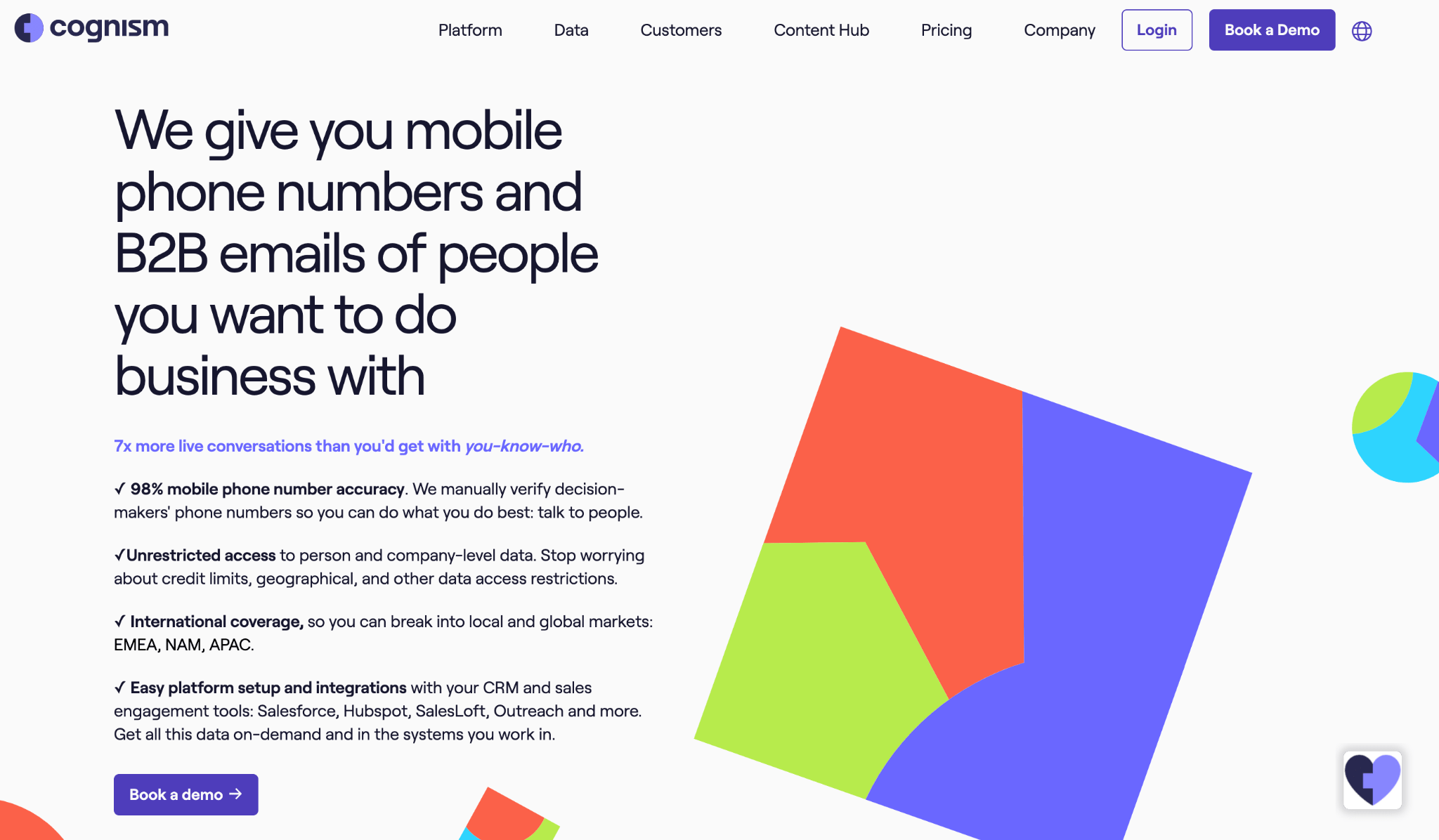
European-focused provider with Diamond Data® phone verification and exceptional GDPR compliance. Users report 30% better data quality compared to competitors, with pricing ranging from $12,000-$25,000 annually.
Strengths:
- Phone-verified mobile numbers with 87% connectivity rates
- Diamond Data® technology for guaranteed phone accuracy
- Excellent GDPR compliance framework checking 13 DNC lists
- Strong European and international coverage
- AI-powered search with voice prompts in 2025
Limitations:
- Premium pricing limits accessibility
- Interface complexity for new users
- Limited self-service options
For businesses looking for more affordable or niche solutions, ZoomInfo alternatives like Swordfish, Lead411, and Kaspr offer powerful features with more flexible pricing models.
Emerging Players in Top B2B Data Providers 2025
Persana AI (Y Combinator-backed)
Stands out with waterfall enrichment technology combining data from 75+ sources. Quantum Agent Technology provides AI agents working 24/7 for lead qualification.
Clay
AI-powered data orchestration platform pulling live information from 100+ providers in a spreadsheet-style workspace. High accuracy but steep learning curve.
Generect
Real-time data provider with 98%+ accuracy and bounce rates under 2%. Pay-per-verified-lead model with no monthly commitments.
Top B2B Data Providers 2025: Pricing and Cost Comparison
Unlimited Pricing Plans (Trending)
Modern providers increasingly offer unlimited plans for predictable budgeting:
Swordfish Unlimited:
- Single User: $99/month for unlimited emails and phone numbers
- Team Plans: $299-$599/month for multiple users
- No credit restrictions or hidden fees
- Fair use policies apply for enterprise-level usage
Benefits:
- Encourages data exploration without usage anxiety
- Predictable monthly costs
- Better for high-volume prospecting
- No credit expiration concerns
Credits-Based Pricing (Traditional)
Traditional providers use credit-based models where each contact costs 1-3 credits:
Typical Structure:
- Email contacts: 1 credit ($0.10-$0.30)
- Phone numbers: 2-3 credits ($0.20-$0.90)
- Company data: 1 credit ($0.10-$0.20)
Pros:
- Pay only for data accessed
- Lower upfront costs for testing
- Good for low-volume users
Cons:
- Unpredictable monthly expenses
- Credits often expire monthly
- Teams become conservative with data usage
- Hidden costs for premium features
Enterprise Annual Contracts
Large providers require annual commitments with complex pricing tiers:
ZoomInfo
$14,995-$40,000+ annually depending on seats and features.
Cognism
$12,000-$25,000+ annually for full platform access.
Hybrid Models
Some providers combine subscriptions with usage-based pricing:
- Base monthly fee for platform access ($49-$99)
- Credits for premium features (intent data, technographics)
- Additional costs for phone numbers or real-time enrichment
- Waterfall enrichment charging only for new data found
Data Compliance and Privacy Features of Top B2B Data Providers 2025
Current Regulatory Landscape
By 2025, over 20 US states have enacted comprehensive privacy laws with requirements similar to GDPR and CCPA. This regulatory expansion means B2B data providers must implement robust compliance frameworks or risk exposing clients to significant penalties of up to $7,500 per violation.
Key Compliance Requirements:
GDPR (European Union): To collect or process personal data for direct marketing purposes, you must demonstrate legitimate interest balanced with individual rights, with easy opt-out mechanisms.
CCPA (California): Provides consumers with rights to know, delete, and opt-out of personal information sales, with fines up to $2,500 per violation.
State Privacy Laws: Virginia, Colorado, Connecticut, and 17+ other states have similar requirements creating overlapping obligations for national campaigns.
Key Compliance Features for Top B2B Data Providers 2025
Advanced Data Exclusion Controls: Top providers allow you to exclude EU residents, California residents, or specific geographic regions from searches while maintaining database coverage.
Automated Consent Management: Leading platforms track data sources and consent status automatically, ensuring you can demonstrate lawful basis for processing during audits.
Network-Wide Suppression: Automatic suppression of unsubscribed contacts across all provider services prevents compliance violations and maintains sender reputation.
Data Retention Controls: Set automatic data deletion schedules to comply with privacy law requirements for data minimization and storage limitation.
Comprehensive Audit Trails: Detailed logging of data access, usage, and sharing for compliance reporting and regulatory inquiries.
Provider-Specific Compliance Features
Swordfish:
- GDPR-compliant (no EU-based individuals included)
- CCPA fully compliant with registered data broker status
- Transparent data sourcing documentation
- Automatic suppression list updates
ZoomInfo:
- Comprehensive compliance framework with legal team oversight
- Data processing agreements available for enterprise clients
- Regular third-party security audits and certifications
Cognism:
- Diamond Data® ensures GDPR compliance for phone numbers
- European data expertise with local privacy law knowledge
- Privacy-by-design approach to data collection and processing
Integration Capabilities and API Access of Top B2B Data Providers 2025
CRM Integrations in 2025
Modern B2B data providers must integrate seamlessly with existing sales and marketing tech stacks:
Native Integrations
Look for pre-built connectors with popular platforms like:
- Salesforce (standard across all enterprise providers)
- HubSpot (increasingly common in SMB solutions)
- Pipedrive (growing presence in mid-market tools)
- Outreach/SalesLoft (sales engagement platform integration)
- Microsoft Dynamics (enterprise requirement)
or the Best Recruitment CRM Software that can help optimize your recruitment processes.
Bi-Directional Sync
The best integrations allow data to flow both ways, enriching CRM records while maintaining data hygiene and preventing duplicate records.
Real-Time Enrichment
Automatic data enrichment as contacts are added to CRM, ensuring records stay current without manual intervention.
API Capabilities and Technical Features
RESTful APIs
Standard for modern providers, enabling custom integrations and bulk operations with proper error handling and response codes.
Rate Limits
Enterprise providers typically offer higher rate limits (1000+ requests/minute) versus SMB providers (100-500 requests/minute).
Webhooks
Real-time notifications for data updates, validation results, and compliance events allow immediate response to data changes.
Bulk Processing
File upload and batch enrichment capabilities for processing large contact lists efficiently. Waterfall API Access: Advanced providers like Clay and Persana offer API access to multiple data sources through a single endpoint.
Browser Tools and Extensions
LinkedIn Integration
Essential for social selling workflows, with enhanced features in 2025:
- Real-time profile data extraction
- Bulk contact discovery from search results
- Intent signal overlay on LinkedIn profiles
- Direct export to CRM or CSV
Email Finder Tools
Use email finder tools or browser extensions that discover contact information while browsing company websites with improved accuracy.
Prospecting Workflows
Integrated workflows combining research, verification, and outreach in unified interfaces.
Key Competitors and Market Leaders Analysis
Established Market Leaders
ZoomInfo
Dominates enterprise B2B data with 321M+ profiles and advanced AI features. Best for large sales organizations with complex needs and substantial budgets ($15,000+ annually).
Cognism
European-focused leader with Diamond Data® technology achieving 87% phone connectivity rates. Essential for companies with significant EU market presence requiring strict GDPR compliance.
Rising Challengers Making Waves in 2025
Persana AI
Y Combinator-backed platform using waterfall enrichment across 75+ data sources. Quantum Agent Technology provides 24/7 AI-powered lead qualification and enrichment.
Clay
AI-powered data orchestration platform allowing custom workflows with 100+ data sources. High accuracy but requires technical expertise for optimal use.
Generect
Real-time data provider with 98%+ accuracy and pay-per-verified-lead model. Growing rapidly among SMBs seeking flexible pricing.
Specialized Providers
Swordfish
Excels in personal contact data (emails, cell phones) with unlimited pricing models. Perfect for recruitment, real estate, and high-touch sales scenarios requiring direct access.
Kaspr
Chrome extension specialist with enhanced LinkedIn integration and real-time data collection from 150+ sources. Good entry-level option for individual sales reps.
Lead411
Mid-market provider combining contact data with intent signals and technographic insights. Balanced option for growing companies needing buyer intent data.
Apollo.io
All-in-one platform with 210M+ contacts, Living Data Network, and integrated outreach tools. Popular among SMBs wanting prospecting and engagement in one platform.
Industry-Specific Players
Salutary Data
Healthcare-focused with HIPAA compliance and 11M+ healthcare provider contacts
Coresignal
Alternative data specialist with 685M+ records updated monthly Forager.ai: AI-powered platform with consistently high data quality ratings from users
Recommendations by Business Size and Use Case
Startups and Small Teams (1-10 people)
Best Choice: Swordfish
- Why: Unlimited plans eliminate usage anxiety while providing high-quality personal contact data at $99/month
- Cost: $99/month single user, $599/month small teams
- Key Benefits: 95% accuracy guarantee, real-time validation, transparent pricing, no credit restrictions
Alternative: Kaspr
- Why: User-friendly interface with strong LinkedIn integration and free trial option
- Cost: Free plan available, paid plans $49-$99/month
- Key Benefits: Easy onboarding, good for social selling, Chrome extension
Read More: Top 10 Kaspr Alternatives And Competitors of 2025
Growing Companies (10-50 people)
Best Choice: Lead411 or Apollo.io
- Why: Balance of features, data quality, and reasonable pricing with team collaboration tools
- Cost: $100-$300/month (Lead411) or $49-$119/user/month (Apollo.io)
- Key Benefits: Intent data, technographics, team features, CRM integration
Alternative: Cognism (for European focus)
- Why: Superior GDPR compliance and European data quality with Diamond Data® technology
- Cost: Custom pricing typically $1,000-$2,000/month for growing teams
- Key Benefits: Phone-verified numbers, compliance expertise, global coverage
Enterprise Organizations (50+ people)
Best Choice: ZoomInfo
- Why: Most comprehensive platform with advanced features, largest database, and enterprise-grade security
- Cost: $14,995-$40,000+ annually depending on features and users
- Key Benefits: Complete sales intelligence platform, advanced integrations, dedicated support, AI-powered insights
Alternative: Cognism (for global operations)
- Why: Strong international coverage with exceptional compliance framework
- Cost: $12,000-$25,000+ annually for enterprise features
- Key Benefits: Diamond Data® verification, GDPR expertise, global database
Use Case-Specific Recommendations
Recruitment Teams
Swordfish (personal emails, cell phones, unlimited usage for high-volume sourcing)
Real Estate Professionals
Swordfish (property owner contact data, skip tracing capabilities)
Healthcare Sales
Salutary Data (HIPAA compliance, physician data, specialized healthcare coverage)
Technology Sales
ZoomInfo or Cognism (technographic data, intent signals, software adoption tracking)
European Markets
Cognism (GDPR compliance, local data sources, Diamond Data® phone verification)
High-Volume Outbound
Apollo.io or Clay (integrated outreach tools, bulk processing, workflow automation)
Future Trends and What to Expect in 2025-2026
AI-Powered Data Quality Revolution
Machine learning algorithms are dramatically improving data accuracy and freshness throughout 2025:
Predictive Data Decay Models: AI algorithms predict when contact data will become outdated, proactively refreshing information before it becomes invalid.
AI-Powered Email Validation: Advanced verification using behavioral analysis, engagement patterns, and delivery tracking to achieve 98%+ accuracy.
Smart Duplicate Detection: Machine learning identifies and merges duplicate records across multiple data sources automatically.
Automated Data Source Scoring: AI evaluates and ranks data sources in real-time, prioritizing the most reliable information.
Privacy-First Architectures
Complying with GDPR, CCPA, and expanding state privacy laws requires fundamental changes to data architecture:
Zero-Party Data Collection: Direct data collection from prospects through interactive content, surveys, and consent-based methods.
Consent Management Platforms: Integrated consent tracking across all data sources with automated compliance monitoring.
Privacy-Preserving Data Sharing: Techniques like differential privacy allowing data insights without exposing individual information.
Automated Compliance Monitoring: AI systems that continuously monitor data usage for compliance violations and automatically apply corrections.
Real-Time Everything
The shift toward real-time data validation, enrichment, and intent detection accelerates:
Live Email Verification: Instant email validation at the point of data access with sub-second response times.
Real-Time Phone Connectivity: Dynamic phone number validation checking line status, carrier information, and Do Not Call registry status.
Dynamic Data Enrichment: Automatic data updates as information changes across web sources and social platforms.
Instant Intent Detection: Real-time identification of buying signals from job changes, funding events, and technology adoptions.
Integration-First Approach
Standalone data tools are becoming obsolete as providers focus on seamless workflow integration:
Native CRM Embedding: Data providers building directly into CRM interfaces rather than requiring separate platforms.
Sales Engagement Platform Integration: Deep integration with outreach tools for seamless prospecting-to-engagement workflows.
Marketing Automation Connectivity: Automatic lead scoring and nurturing based on data provider insights.
Custom API Development: Providers offering white-label APIs for software companies to embed data capabilities.
Emerging Technologies
Waterfall Enrichment: Multi-source data combining becomes standard, with providers like Persana and Clay leading adoption.
Voice-Activated Search: AI-powered voice prompts for data discovery, as implemented by Cognism in 2025.
Quantum Agent Technology: AI agents working 24/7 for lead qualification and data enrichment, pioneered by Persana AI.
Blockchain Verification: Immutable data quality tracking and consent management using distributed ledger technology.
Conclusion: Choosing Your B2B Data Provider Partner for Success
Selecting the right B2B data provider in 2025 requires balancing data quality, compliance requirements, pricing models, and integration capabilities. The landscape has matured beyond simple contact databases to comprehensive sales intelligence platforms with AI-powered features and real-time validation.
For most businesses, the decision comes down to three key factors:
Budget and Pricing Model
Unlimited plans like Swordfish ($99-$599/month) offer predictable costs and encourage data exploration, while enterprise solutions (ZoomInfo $15,000+) provide comprehensive features but require significant investment.
Data Requirements
Personal contact data specialists (Swordfish) versus comprehensive business intelligence (ZoomInfo) versus compliance-first European data (Cognism) versus AI-powered waterfall enrichment (Persana, Clay).
Integration Needs
Standalone tools work for small teams needing simple prospecting, while enterprise organizations require deep CRM integration, API access, and workflow automation.
Key Success Factors for 2025:
- Prioritize 95%+ accuracy guarantees with real-time validation
- Ensure GDPR/CCPA compliance with transparent data sourcing
- Choose unlimited pricing for high-volume prospecting
- Demand native CRM integration and API access
- Test data samples before committing to annual contracts
- Consider emerging technologies like waterfall enrichment and AI-powered personalization
The B2B data provider market will continue evolving rapidly, with AI-powered accuracy improvements, enhanced privacy features, and deeper workflow integrations becoming standard. Choose a provider that demonstrates commitment to innovation while maintaining the fundamentals of data quality, compliance, and transparent pricing. Ready to upgrade your prospecting game?
Try Swordfish for free and experience 95% accuracy with unlimited contact data for just $99/month.
About the Author
Ben Argeband is the Founder and CEO of Swordfish.ai and Heartbeat.ai. With deep expertise in data and SaaS, he has built two successful platforms trusted by over 50,000 sales and recruitment professionals. Ben’s mission is to help teams find direct contact information for hard-to-reach professionals and decision-makers, providing the shortest route to their next win. Connect with Ben on LinkedIn.
Frequently Asked Questions
1. What is the current standard for B2B data accuracy in 2025?
Leading B2B data providers now guarantee email accuracy rates between 95% and 98%, often with reported bounce rates under 2%. The best platforms use real-time verification, SMTP checks, domain verification, and AI-powered validation to maintain database freshness, which is critical since contact data decays at an estimated 22% annually.
2. What is “Diamond Data®” and why is it important?
Diamond Data® is Cognism’s proprietary technology, primarily focused on phone number verification. It ensures that mobile numbers are phone-verified by human researchers, leading to high connectivity rates (reported as high as 87%). This is particularly valuable for compliance with GDPR and DNC lists.
3. What is ‘Waterfall Enrichment’ and how does it benefit my sales team?
Waterfall enrichment is a data orchestration technique where a provider sequentially queries data from multiple sources (sometimes 75+ different providers) to fill in missing prospect information. This maximizes coverage and accuracy by combining the strengths of various databases, ensuring you get the most complete and fresh record possible.

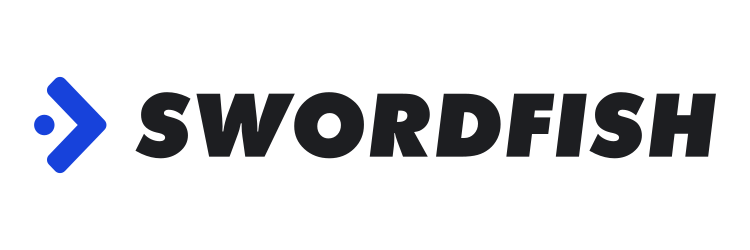
 View Products
View Products


